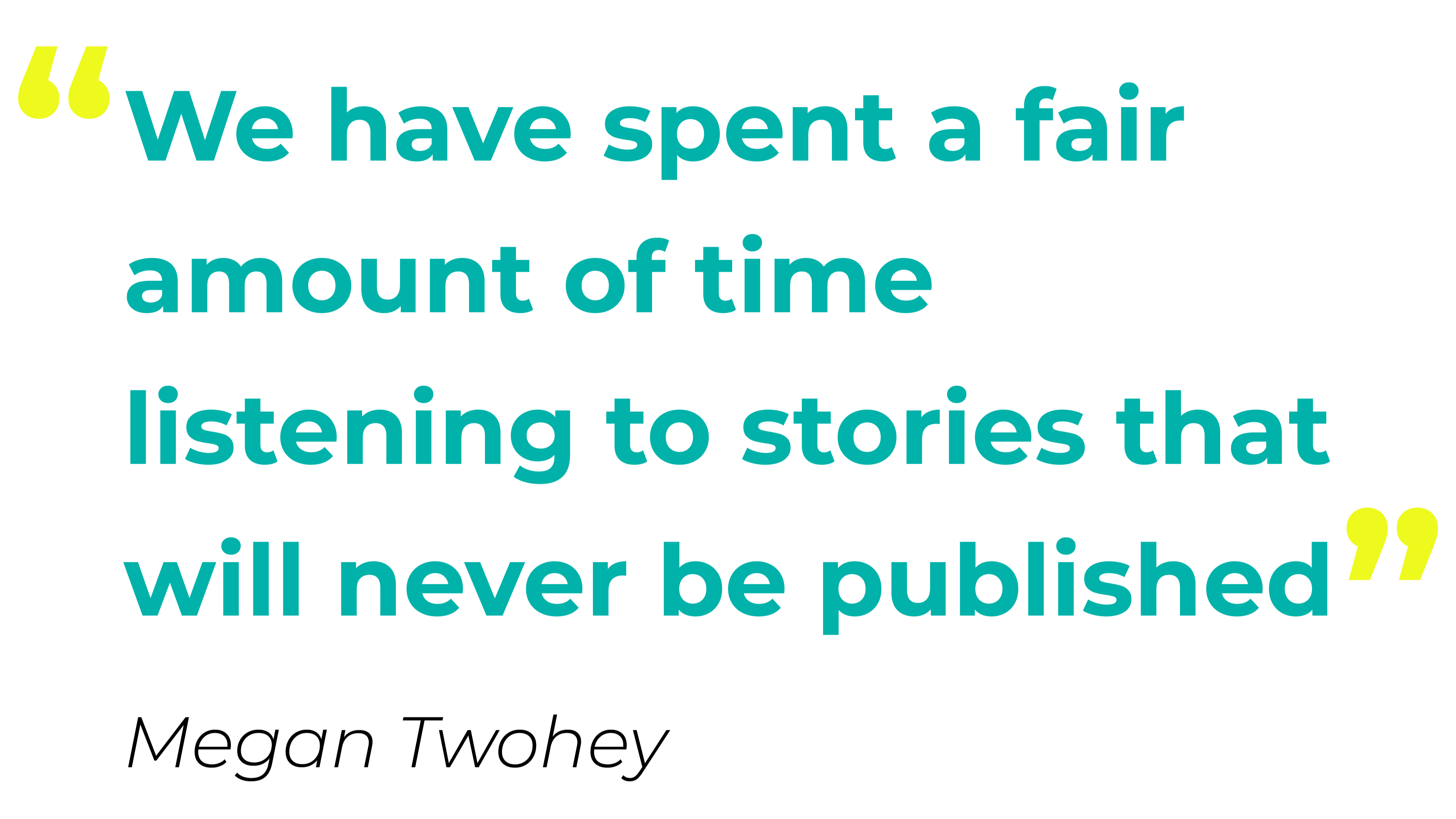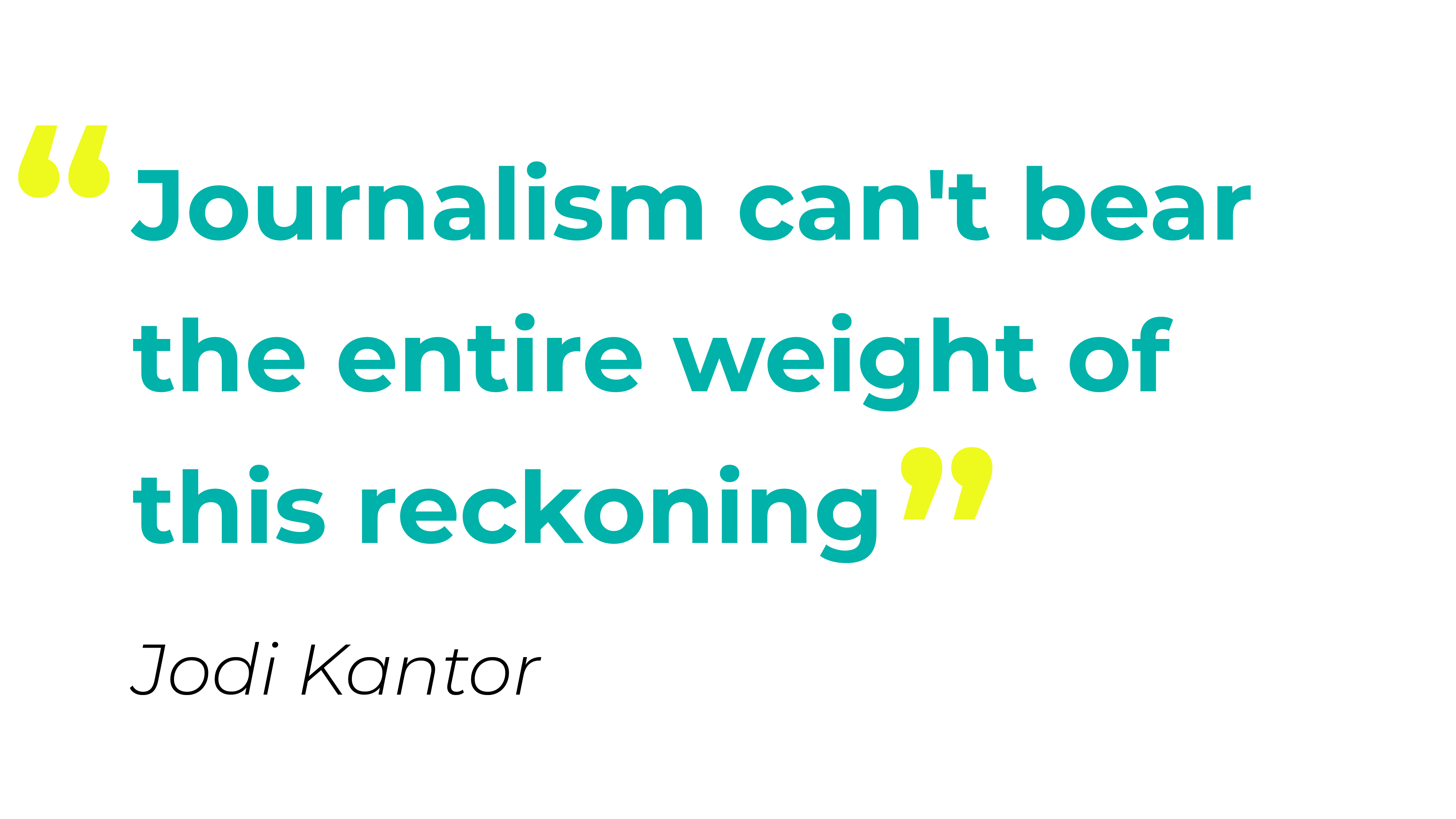The Story
It’s been nearly two years since Harvey Weinstein became synonymous with the words #MeToo. We recently talked to New York Times reporters Jodi Kantor and Megan Twohey, who have a new book out called “She Said: Breaking the Sexual Harassment Story That Helped Ignite a Movement." They write about how they broke the story, the intimidation tactics Weinstein’s team used to try to stop them, and what happened after they hit publish. Here's what they had to say:
Q: Sexual harassment is not a new story. This one changed the way we as a society view sexual harassment and how seriously we take victims. What was different this time?
MT: I think for people to see that even some of the most famous women in the world – with a lot of power and resources – that even they had been victimized was an indication that nobody is immune. And secondly, one of the things that we wanted to do with the reporting of this book was to show that it really went even beyond sexual harassment to the broader questions of abuse of power.This was really an x-ray into the machinery that's in place to silence victims and the question of how people become complicit. I think that people became ultimately really eager to grapple with those questions.
Q: After the first Weinstein story comes out, you write about how you were inundated with calls and emails...from other women wanting to tell their stories. How do you decide what to go after next?
JK: It's an editor's decision, but also something we debate collectively at The Times. Basically, we try to keep track of the tips and there's always discussion about which stories seem most urgent, which stories involve a lot of harm, which stories can have a lot of impact if they're published, what the degree of cover-up is, which tips appear to come with real evidence. But one thing Megan and I feel really powerfully is that journalism can't bear the entire weight of this reckoning...This is not a problem that journalism can solve by itself.

Q: In that moment when women are confiding in you, what do you tell them?
MT: We try to respond to everybody who writes or calls us or make sure that we're passing it along to a colleague at The Times who can respond. But there are also times where, you know, I've woken up at 3:00 in the morning, kind of jolted up in bed and said, "Oh my goodness, did I not respond to that woman who sent me an email three weeks ago? Did she somehow slip through the cracks?"It still continues to feel like this huge responsibility that we're handling. And trying to rise to the occasion...And honestly, we can't report out all these stories...We have spent a fair amount of time listening to stories that will never be published.

Q: With Weinstein in particular, you heard some pretty infuriating allegations. How do you absorb all of that and continue to remain impartial stewards of this story?
JK: What your audience might be surprised to learn is that there's something a tiny bit clinical for us about listening to these stories. And I don't mean to sound uncompassionate. You're a little bit like a doctor in that you're looking for certain things. When a woman is telling one of these stories, you're looking for signs of, what are the dates involved, what are the geographic locations, did she tell anybody, what level of detail does she remember or not remember?
Q: Two years later, what questions do you still have?
JK: Well, where do we start. Harvey Weinstein has never sat down and given a full interview about these allegations. His responses to our initial reporting were very confusing because he swung back and forth between denial and remorse and back again. Without going into too much detail, there are many women who have never come forward about Weinstein, so I think there are questions about whether we'll ever have a full accounting of all of those people's stories. In our book, we focused on that question of who helped him. And I think we discovered a lot of new and very surprising things. But I think we don't know the full extent of that yet.
Q: We’d love to hear what a typical day was like for you in reporting this story. Reading the book, it all sounds riveting and thrilling. But we also know that a lot of it can just be sitting at a desk, and you get a call and then you hang up and it's not like anything necessarily happens next.
MT: Well, you're absolutely right. Doing investigative reporting of any kind, there are long stretches of kind of knocking your head up against a wall. You can easily spend and we did spend entire days making phone calls and sending emails that were never returned. You're making your way down Google docs and spreadsheets of names and numbers hoping that maybe number 15, maybe number 30 is gonna have information to provide or is gonna be willing to talk to you.Obviously something like those days where you're face to face with Harvey Weinstein are extremely intense and animated. But there are stretches of kind of knocking your head against the wall. And it's really a combination of those that get you to the finish line of an investigation.
Q: One thing we wanted to talk to you guys about was the pervasiveness of NDAs (non-disclosure agreements) that you uncovered. Some people have to sign NDAs just to take a job. It's not even related to sexual harassment necessarily. Megan, you said that you're still hearing that people are signing these every day all the time. Why are these still so pervasive?
JK: Well, we're talking about two different kinds of NDAs here. The kind that you have to sign to go to work for a company, that's one kind of NDA that sort of blanket covers any employee who goes to work there. That can be a problem when it comes to sexual abuse because if there's a serious allegation at that company, the NDA can silence the person who wants to tell the story, witnesses, et cetera, et cetera.In the last two years, people have really begun to question whether those kinds of company NDAs should apply in cases of sexual harassment or abuse...The other kinds of NDAs are the confidentiality agreements that women who settle claims have to sign. For a lot of women who have experienced sexual harassment or assault, especially in the workplace, when they show up to a lawyer's office and say to the lawyer, "What do I do? Do we have to take this to court?" The lawyer will often say, "No, we're going to settle this." ...The problem is that collectively, these confidential settlements have helped enable abusers. And so the question that we've asked in our reporting is, is this really the best way that our country can think of to deal with sexual harassment and abuse? And is it even reasonable or fair to ask a woman, no matter how much money she gets, not to be able to talk about her own experiences? Rowena Chiu, a woman who came forward in our book, describes not even having told her own husband what happened to her because she had a settlement.

Q: The first year of #MeToo felt like it had a lot of momentum. Time's Up was founded, it was very prominent at awards season. Now another year has passed. Where do you think things stand with that momentum?
MT: We always stress that there's a distinction between activists and journalists. Our job is to collect the facts and publish them. I think that two years in, there's agreement that both the accusers and the accused feel like there hasn't been adequate reform to make sure that everybody is adequately protected. But as journalists, we really feel like you can't solve a problem that you cannot see. And so we are going to continue to collect the facts and bring them to light.
Q: What should people know about sexual harassment law? What can people do?
MT: I would say that no matter what, it's really valuable to document what's happened in some way. Because what we've found in the course of our reporting is that documentation can go a long way if you do in fact decide to move forward...HR can be one valuable path to go down.Then people are presented with the option of whether or not they're going to turn to an attorney for help. Lots of times, attorneys will advise that women enter these secret, out-of-court settlements. It's worth learning a little bit more about what those restrictive clauses are going to look like and whether or not they're willing to do that type of silence.The other path is whether or not they want to take a report to the government. There are government agencies that have been created to deal with complaints about sexual harassment and other types of discrimination in the workplace...which field those complaints and basically send somebody on a track in which they can be fed into the civil court system...That's where you can basically end up on a track in which you might go to a public trial.I think it's important for people to know that there are a variety of options. There's not just one single thing that you do. And that it's worth doing proper homework on all different tracks.
Q: You both have been doing press all week. What aren’t people asking about that you wish you could talk about?
MT: Honestly, you know, two-thirds of our book focuses on the Weinstein investigation. But the last third of the book really goes behind the scenes of the experience of Christine Blasey Ford, one of the most polarizing figures in the #MeToo movement. This is the first time that she's ever granted interviews and this is the first private account of...her behind-the-scenes experience. This is the part of the book where things get more complicated and more confusing. I think that we're just hoping that readers will find that nourishing.PS: This interview has been edited for length and clarity.PPS: Jodi and Megan filled out our Words With Author Friends questionnaire over here. We also talked with them on the latest episode of Skimm'd from the Couch, here.
Live Smarter
Sign up for the Daily Skimm email newsletter. Delivered to your inbox every morning and prepares you for your day in minutes.





